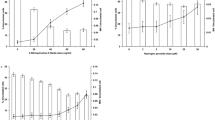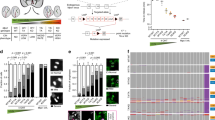Abstract
PRIMARY tumours induced by polycyclic hydrocarbons have been examined by several investigators to evaluate the importance of karyotype modification in carcinogenesis1–3. A significant number of such tumours has been characterized by cells with aneuploid chromosome numbers. In a study of 14 fibrosarcomas induced by methylcholanthrene in a variety of F1 hybrids of inbred mouse strains, Hellström2 reported that only 4 tumours contained predominantly diploid cells. The cells comprising the remaining ten tumours were either hyperdiploid, triploid, or hypertetraploid. Marked variability in chromosomal pattern was observed from one tumour to another as well as within any one tumour.
This is a preview of subscription content, access via your institution
Access options
Subscribe to this journal
Receive 51 print issues and online access
$199.00 per year
only $3.90 per issue
Buy this article
- Purchase on Springer Link
- Instant access to full article PDF
Prices may be subject to local taxes which are calculated during checkout
Similar content being viewed by others
References
Bayreuther, K., Nature, 186, 6 (1960).
Hellström, K. E., J. Nat. Cancer Inst., 23, 1019 (1959).
Stich, H. F., J. Nat. Cancer Inst., 25, 649 (1960).
Author information
Authors and Affiliations
Rights and permissions
About this article
Cite this article
BIEDLER, J., OLD, L. & CLARKE, D. Chromosomal Lesion associated with Carcinogen-induced Tumours in Mice. Nature 192, 286–288 (1961). https://doi.org/10.1038/192286a0
Issue Date:
DOI: https://doi.org/10.1038/192286a0
This article is cited by
-
Chromosomal changes in 20-Methylcholanthrene induced sarcomas in mice in relation to time of appearance of the tumours
Virchows Archiv B Cell Pathology (1969)
-
The structure and behavior of the nucleolus organizers in mammalian cells
Chromosoma (1967)
Comments
By submitting a comment you agree to abide by our Terms and Community Guidelines. If you find something abusive or that does not comply with our terms or guidelines please flag it as inappropriate.



